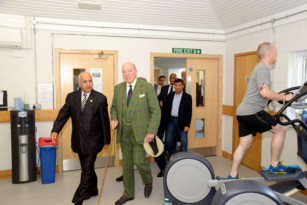
Dundee, Scotland
The crime rate in the UK has reached an all-time high with new statistics revealing that there is an assault on a law enforcement officer every four minutes,
Adding it up it shows that as many as 6,000 policemen are attacked, each day. either through common or aggravated assault, drunken driving, drugs or terrorism.
Over 40,000 of these victims suffer various forms of injury from the attacks.
Wayne Marques. the British Transport Police officer who confronted the three terrorists when they struck London Bridge in June, is one among the many who suffered significant injury as he helped protect innocent people on the street from the knife-wielding assailants.
Marques, 38, was hospitalised with major cuts to the head and leg. He is still convalasing and contemplating what he should do next. when he makes a full recovery.
One of the dillemas confronting him will be a return to police duty, a responsibility that almost cost him his life.
The stress of police work. and in particular the London Bridge incident. will have greatly affected not just his physical well-being but his mental health and confidence in a job that has always been close to his heart.
However, there is hope for officers of the law, who like Marques, have had their lives turned inside out.
Many of them will go to hospitals and rehabilitation centres like the one at The Police Treatment Centres in Castlebrae, Scotland where they will hope to find a cure for their injuries and post-traumatic stress disorder.
The registered charity, which is supported by over 60,000 patrons including its principal donor, Shaikh Hamdan Bin Rashid Al Maktoum, Deputy Ruler of Dubai and Minister of Finance, offers a ray of hope.
Almost 4,000 serving and retired officers are treated each year at the facility which offers intensive, police-specific physiotherapy and rehabilitation. It is one of the two unique Treatment Centres of it’s kind in the UK, with the other being at St Andrews, in Harrogate, North Yorkshire.
“It’s quite a difficult and stressful time to be a police officer in the UK at the moment,” Patrick Cairns, Chief Executive of the Castlebrae centre told Gulf News.
“Numbers have been cut and the streets are more and more dangerous now with criminals with guns and knives on the prowl. There is less respect than ever for government authority and police offices and that is translated into some of the dangers that they face now.
“Last year 2.4 million police officers were attacked, with one in every five minutes. Many officers would go to work not knowing what dangers they will face,” he added.
“We at Castlebrae are conditioned to treat both physical and psychological injuries and our aim is to get the injured officer back on his feet as soon as possible.
“We have a wide range of treatments and skills and embrace new and old treatments,” said Cairns, a former Army Officer who has served around the world in a variety of roles as a Commander, a Staff Officer and an Instructor.
“We conduct classes and educational talks that are designed to help people with their health and fitness
“A key are is the Psychological Wellbeing Programme because a growing number of men and women suffer from stress related conditions after being attacked or injured.”
Cairns stressed that every police officers should have the right to go to work and not be assaulted.
He said police officers are very often the first responders to serious accidents and dangerous incidents, dealing with death, distress and aggression. They often have to see and hear things that other members of the public would simply not be able to cope with.
“Many of the police officers currently being treated here are part of that number who are injured or ill,” Cairns revealed. “It’s quite a challenging environment but we believe we have what it takes to help them make a quick recovery and to return to their normal lives, many even to work as police officers again.”












